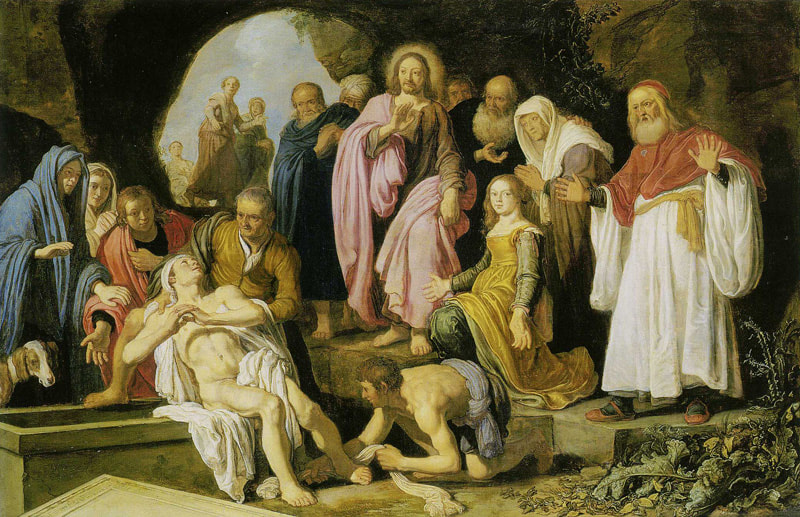|
What are miracles? Why does Jesus perform them, like the raising of Lazarus, and why does God perform them through the prophets, like Moses parting the seas? These may seem to be simple questions, on the face of it. For the first, you might say miracles are “a suspension of the natural order,” or perhaps “an overriding of the natural order.” More generally you might just say a miracle is some manner of extraordinary act or event that occurs by divine power. But none of these seem very satisfying an answer. Why would God create the natural order and then go about violating the very thing He just created? It seems more than a little contradictive. It’s hard to consider these things an “answer” at all. How do we reconcile the fact that miracles occur with the equal fact that the natural order of things was divinely ordained? In Part 2, chapter five of The Lord, Guardini gets us closer to an answer. He calls miracles not a suspension of natural order, but a fulfillment of natural order. That is, he views miracles as an elevation of the natural order to something greater than it is presently. “For when a miracle takes place, natural law is not ‘interrupted,’ but rather, at a given moment forced to obey a higher law, a law that is absolutely realistic and significant . . . Logic and natural science rest on the assumption that the world comprises an entity, complete in itself, in which other than natural factors have no place. To this faith replies: The world lies in God’s hand. He is Power, Creator in the pure and infinite sense of the word, and when he commands, the ordered world obediently and constructively submits to his will.” -Romano Guardini ("The Lord") The miraculous event is not God pressing “pause” on nature at a given moment. Nature does not exist independent of God. He did not merely hit the “create” button and step back to observe, to occasionally inject Himself when He felt the need. Everything in the natural world, everything that is, only is because God wills it to be, in a very literal sense. God is the source of all being, continuously willing that all that is participates in His being, so that it can be as well. His will is the foundation on which everything relies. Without it, nothing would be at all. It continually sustains everything in existence. If He were to cease willing, everything would cease along with it. Only within this context can we begin to consider the “what” of miracles. If the divine will is what sustains everything in existence at any given moment, then it’s easy to see what Guardini is saying. God wills that things are the way they are, and at certain points in human history God wills that things be greater. And nature, being utterly dependent on God, obeys. That obedience and submission to the divine will is what Guardini means when he says “What then occurs is a miracle in which natural law is not suspended but fulfilled on a higher level.” But what about the second question? Why do miracles occur? Meaning for what purpose, not simply “because God wills them to occur.” It also doesn’t seem enough to say that miracles occur to act as a sign, though that is certainly true. A sign of what? To get to that answer, Guardini takes us to the realm of the astronomer. To the astronomer, the world is an insignificant speck. The blue dot whirling in an infinite expanse of uncountable other worlds, only significant to us because we happen to live here, but otherwise utterly uncompelling. But the fact that God chooses to perform miracles here, on this tiny blue dot in the infinite universe, tells us that this world may not be so insignificant after all. “It becomes evident that for God those mites on the grain of sand lost in immeasurable space are more important than the Milky Way or the whole universe; that the short span of time in which life endures on earth is more important than all the light years of astronomy. The few years of human existence, the ten years of solitude that a widow perhaps has before her, weigh more in God’s eyes than all the aeons that solar systems require to evolve and decline. God would never sacrifice a single human heart for the preservation of Sirius or Andromadae, yet when his holy omniscience confronts human suffering incapable of recognizing its hidden significant any other way, he commands natural law to a higher service . . .” -Romano Guardini ("The Lord") It is in miracles that we see the kind of God that God is. God performs miracles because of His love. He is not merely the god of the philosophers, the First Cause that kicked off a causal chain. God is love, and His love overflows, and sometimes manifests itself to us as miracles. Miracles reveal God as a personal God, as a God who cares and as a God whom we can love back. The god of the philosophers is remote, cold, and uncaring. But God is ever near, holding us in His hand. He is moved by our struggles and our suffering, and every so often He commands the natural order to become more than itself, so that we might be reminded of this fact: God is love.
0 Comments
|
Series Info
Every day of Lent, I am writing a reflection piece on two chapters of "The Lord" by Romano Guardini. If you'd like to read or follow along, you can find the full calendar of where we're at below, or Click Here for the main landing page. Archives
April 2020
Categories
All
|

 RSS Feed
RSS Feed